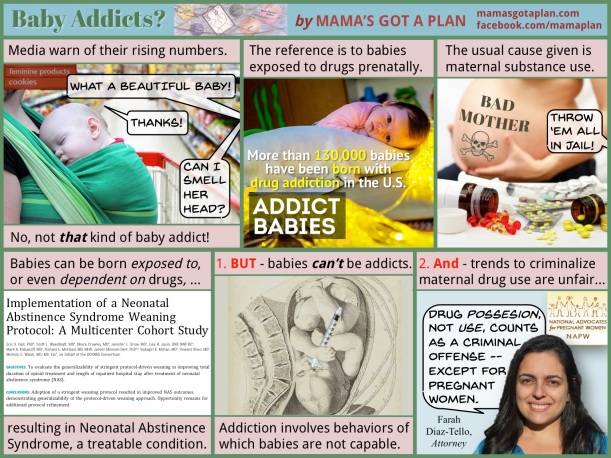

The condition of suffering babies is something everyone can comfortably decry. Sources like the video These Babies Were Born Addicted to Drugs rush to tell us how many babies are afflicted and how worthy of condemnation are their mothers for using drugs – usually opioids – while pregnant. The babies’ symptoms – trembling, shrill cries – are described in great detail. One cannot help feeling that any woman who would subject her baby to such a fate must be a monster.
The only problem is the facts. Babies suffering from Neonatal Abstinence Symptom can and are treated. The symptoms of NAS are often conflated with those of poverty or alcohol and tobacco use. More to the point, to describe babies as addicts is incorrect. Addiction is defined as “a chronic, relapsing brain disease that is characterized by compulsive drug seeking and use, despite harmful consequences.” One cannot accuse babies or fetuses, for that matter, of drug-seeking behavior. Rather, babies whose mothers used substances while pregnant can best be described as drug-exposed or drug-dependent.
To criminalize mothers for their pregnancy outcomes based on substance use is neither just nor effective. Typically, drug possession is a chargeable offense, not drug use. However, in the case of pregnant women, drug use, as determined by drug testing of mothers or newborns, is treated as a crime. Medical providers often fail to inform by their pregnant patients that they are being tested for substances; this is more likely to be the case for those receiving publicly-funded health care. Although health care providers are not permitted to test pregnant people for the express purpose of informing law enforcement, they may nevertheless use maternal testing as a screening mechanism to determine which newborns will be tested. Many states require providers in their role of mandatory reporter to report all such cases to child welfare agencies, who are then free to refer cases for criminal charges.
Prosecuting parents for prenatal drug use is of little benefit. Incarceration is not known to improve the health of pregnant people or their babies. Indeed, while awaiting sentencing in a holding facility, these pregnant people might not receive any health care at all, much less substance treatment. Furthermore, incarceration almost invariably results in the separation of parent and child, an act with far greater negative consequences than most drug use.
Removal of children by child welfare authorities for parental drug use – including legal medical marijuana use! – is not in the best interest of children or parents. Other countries do not automatically assume that drug use renders parents unfit. Determinations of abuse and neglect should be made based on abuse and neglect.
Nor is state involvement equally visited upon the population. Disadvantaged groups, such as poor women and women of color, are more likely to be subject to reprisals based on drug use than are their wealthier white counterparts. However, the fear engendered by medical providers’ role in reporting drug use is sufficient to cause many pregnant people to avoid care altogether – hardly a public health good.
In the 1980s and 90s, media were abuzz with accounts of “crack babies,” children said to have been exposed to crack cocaine in utero. Dire predictions abounded regarding the eventual fate of these children. However, even at the time, it was known that other legal substances – such as tobacco – were much more harmful to fetuses than crack cocaine. Nevertheless, because the crack baby story fed into the War on Drugs initiative proposed by Ronald Reagan – itself a piece of social policy with scant evidence basis – and because it made for dramatic television, it led to severe consequences to many parents and children.
The insistence on condemning mothers of babies exposed to opioids may well be equally suspect. Drug addiction should be treated as a public health issue rather than as a criminal law issue, moves to reduce income inequality and racial bias will do more to aid mothers and babies than incarceration, and blaming women for their pregnancy outcomes will result in less liberty for women in all aspects of their reproductive lives.
[Photos of Farah Diaz-Tello, of National Advocates for Pregnant Women, and Cherisse A. Scott, of SisterReach, used with permission.]
[Updated 6/1/2016, 9:30pm, for grammar and stylistic changes, and again on 6/4/2016 and 9/2/2016. Updated 7/16/2016 with copyright designation.]
